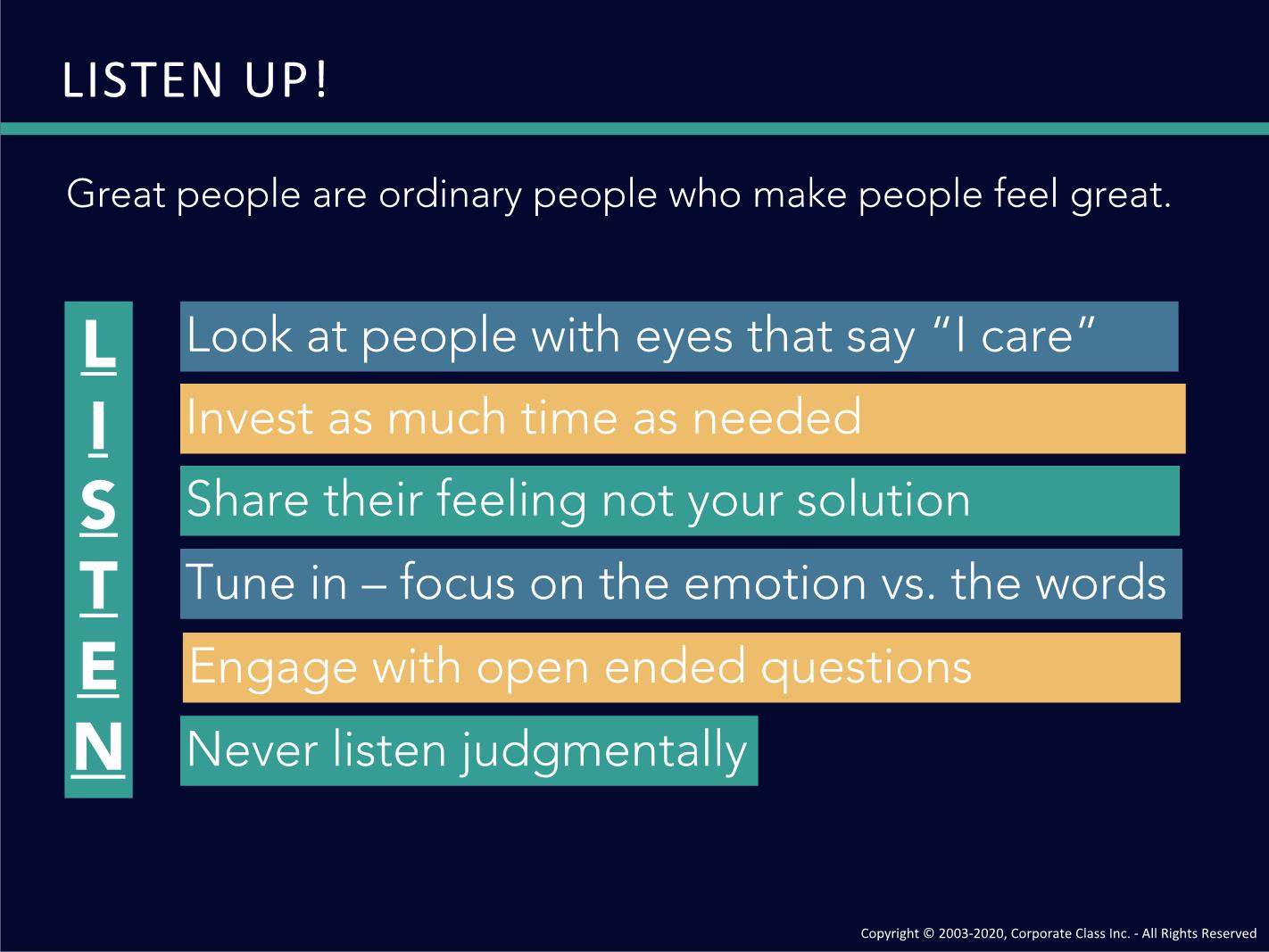What are the most important skills to have to get ahead in your career? Some essential skills include increasing your visibility, getting others to perceive you in a positive light, developing your executive presence and having strong interpersonal communication skills.
What are interpersonal skills?
A general definition would be that interpersonal skills are the skills required to effectively communicate both verbally and non-verbally. According to a recent article in Hubpages, Terersa Coppens groups interpersonal skills into four main categories:
Most interpersonal skills can be grouped under one of four main forms of communication: verbal, listening, written and non-verbal communication. Some skills such as recognition of stress and attitude are important to all forms of interpersonal communication. Effective communication skills result in mutual understanding. Poor communication wastes time and resources, get in the way of accomplishing goals and can sour relationships.
Some people may view interpersonal skills as a natural talent that people either have or don’t. But the truth is that they are skills that can easily be learned and developed. One of the best ways to improve any skill is through active and continuous practice. There are several ways in which all 4 types of interpersonal communication can be improved upon and several reasons why you may want to.
What are the 4 types of interpersonal communication skills?

Listening skills (possibly the most important of all communication skills) and verbal skills include:
- Relaxation – a calm, self-confident manner allows for more coherent verbal expression and gives the impression of an active listener.
- Positive attitude – all people prefer communicating with the happy, accepting person.
- Empathy – by seeing, understanding and respecting another’s point of view, a person gains respect and the trust of others as a speaker and is seen as an attentive listener.
- Understanding stress in yourself and others – allows for self-monitoring of your own verbal communication and a greater understanding of a speaker’s motivations; you realize when your tone of voice or word choice is affected by internal feelings of stress and as well understand when you are listening to someone who’s speech is affected by stress; it allows you to compensate accordingly.
- Assertiveness – this quality is essential and fundamental to negotiation in that the participants express beliefs in a way others can understand but also respect the thoughts and feelings of all involved
- Teamwork – includes adaptability and flexibility in dealing with differing personalities and differing interpersonal skill levels.

Active listening – A successful communication skill
When listening to someone speaking, you can simply passively hear their message or actively listen to understand, learn, and respond. When learning how to listen to others actively, you can learn more about different people’s insights, perspectives, and experiences.
Using active listening in the workplace can accelerate growth personally and professionally because it facilitates learning from others and considering new ideas. This is undoubtedly one of the most vital skills that can be developed for personal growth. Since listening is one-half of effective communication exchange, it is almost impossible to communicate at all without it.
When we listen actively, we can respond effectively to ensure a beneficial. That is why listening with focus and effort can be critical while remaining as involved in the discussion as the speaker. Sharpening your listening skills can be an essential part of developing effective interpersonal communication skills. Here are a few tips to help you build your active listening:
- Focus on the conversation at hand. Try not to multitask but give the speaker your undivided attention.
- Don’t interrupt the speaker. Interrupting someone might give off the impression that you don’t find what they are saying very important.
- Don’t jump to conclusions. Have patience and allow people to get to the point on their own time and do not try to finish their points for them,
- Ask questions. This shows that you are interested and would like clarity and context.
Written Communication Skills and Interpersonal Communication
Nearly all jobs will require you to write something at some point. Effective written communication can be a make or break for effectively conveying a message to someone else. The ability to write clearly and concisely ensures that everyone you communicate with will understand the message that you are trying to give.
Written communication can share many of the same attributes as verbal communication, good sentence construction and word choice play a vital role in this type of communication, just as with verbal communication. There are, however, a few differences between written and oral communication. Where verbal communication relies greatly on body language, tone of voice and eye contact for added context clues, written communication must convey a message effectively without any of these.
To develop effective written communication, it is crucial to focus on skills that help you gain greater attention to detail and understanding of grammar, punctuation and word choice.
Written skills include:
- Analysis – strong analytical and research skills are key in expressing new ideas and getting them accepted by co-workers and senior management.
- Computer and technical literacy – these skills are essential in the business world as most written communication and all analysis of data occurs on the computer.
- Professionalism – this quality is important in all forms of interpersonal communication techniques including written communication; standard formats for business correspondence are common, and spelling mistakes and grammatical errors are unacceptable, eroding a worker’s value in the firm
Non-verbal interpersonal skills include:
- Body language
- Eye-contact
- Micro-facial expressions
Eye contact: Its role in interpersonal communication
Eye contact is one of the best-known aspects of non-verbal communication. From eye contact or a lack thereof, it is possible to tell a lot about someone and their intentions. When someone can establish good eye contact, they are perceived as trustworthy and confident, at least according to western culture.
When someone subsequently fails to maintain eye contact, they are perceived as less credible or reliable when they look down or if their eyes constantly stray. That being said, there is also a more refined nuance when it comes to breaks of gaze. When expressing condolences, a drop of gaze might portray genuine sympathy or compassion. A drop in gaze may also display guilt or remorse when someone is being questioned.
Similarly, there are many different ways in which eye contact can be very revealing during a conversation. For example, an active listener will most likely focus their gaze on the speaker’s lips when conversing. If the listener breaks this gaze and makes eye contact with the speaker, it can be seen as a non-verbal cue that they would like to interject or say something.
Understanding these subtle nuances of non-verbal communication through eye contact can help you gain more context clues from the conversation and seem more credible and confident during discussions with others.
Body language in interpersonal communication
Body language is what you are saying when you aren’t saying anything. Often, your body language can speak the loudest when you are engaged in conversation with others. Your facial expressions, gestures, posture and tone of voice can reveal a lot about how you are feeling within a conversation.
Non-verbal cues, portrayed in the way you listen, look, move and react are essential in showing other participants in a conversation that you care, are trustworthy and that you are actively listening. Body language gets picked up subconsciously by others. When faced with believing your verbal message or the message portrayed by your body language, most people will feel inclined to judge you by your body language.
Body language is often instinctive and not conscious, which is why it can be a very good indicator of a person’s true feelings and intent. Most of us are constantly analyzing each other’s body language without even realizing it, which is why it can be very beneficial to be aware of your body and the messages you are conveying with it during conversations.
In his pioneering fieldwork, Professor Mehrabian made two key points:
- a) There are 3 elements in face-to-face communications, often called the “3-Vs:”
- Verbal, or words
- Vocal, or tone of voice
- Visual, meaning non-verbal behaviours or Body Language
- b) Visual components communicate far more than verbal – in situations where the words are not compatible with the non-verbal signals – and people tend to believe the behaviour and the tone of voice, not the verbal message.

According to Professor Mehrabian, we evaluate the 3-Vs quite differently. His findings are often called the 7%-38%-55% rule or the Mehrabian formula:
- 7% Verbal
- 38% Vocal
- 55% Visual
His formula was refined under research conditions where there was incompatibility, or incongruence, between words and facial expressions when communicating feelings and attitudes.
Why do interpersonal communication skills matter?
All of the above can reinforce the honesty, integrity and trust of personal interaction with co-workers and clients. In verbal exchanges, a person lacking eye contact is seen as dishonest and/ or lacking confidence in their words. Reliability and responsibility are also conveyed by positive gestures and body language that match the tone and content of the speaker’s voice. Excessive hand gestures and invasion of another’s personal space are intimidating and detracts from the value of the conversation. Leaders with poor non-verbal communication skills are not viewed as effective and leading to lower productivity and poor office morale.
Having good technical and professional skills paired with good communication skills can help professionals stay ahead of the competition. Having the ability to communicate effectively with co-workers, employees and customers can be very beneficial in building effective, solid and lasting interpersonal relationships.
These skills can help collaboration with others, provide guidance, support and reassurance, and convey information effectively. Understanding these skills will also enable you to read a room, understand how your actions affect others, and help you fully grasp what others are trying to tell you.
Interpersonal communication skills in the workplace
While it is imperative that employees possess the technical abilities to fulfill their duties, a well-functioning, effective team highly relies on each team member being able to communicate and highlight concerns with their peers. Technical skills are the hard skills needed to complete tasks, whereas people skills are the soft skills necessary for interpersonal communication and understanding.
A lack of interpersonal skills in a work environment can lead to many issues within the workflow and satisfaction within teams. Lack of communication can easily lead to frustration, disconnect and lowered morale and productivity. The team may not feel that they can function as a team. Communication can also be vital in ensuring that clients do not feel neglected or forgotten. This is why all employees must be able to communicate, provide feedback and listen to concerns.
Improved interpersonal communication in the workplace can be crucial to business success. It falls upon all employers and employees to develop self-awareness of their own interpersonal skills and work on the areas where they might be lacking. A business might be able to motivate its employees to strengthen their communication through incentives and training.
How to assess your own interpersonal communication skills
When assessing your interpersonal skills, many online tools and questionnaires may help you analyze how effectively you communicate with others. Knowing how to discern between effective and ineffective interpersonal skills can be very important as these skills can be the hardest to self-analyze. One way to assess your interpersonal skills is to evaluate all of the aspects of interpersonal communication individually and to determine how effectively you can master each.
Businesses can assess the interpersonal skills of their employees using tests, reports such as reference letters or peer feedback, and conversations with each employee. Employees might even be asked to evaluate each other on several aspects of interpersonal communication. Written and listening skills can be evaluated using comprehension and writing tests.
Although these assessments can be valuable in identifying employees that could benefit from interpersonal skills training, it is important to note that they can be indicative of previous performance and behaviour and might not be an accurate reflection of future performance. Therefore it may also be beneficial to observe employees outside of these assessments to see how they perform on a daily basis.
5 tips to improve your interpersonal communication skills
Developing strong interpersonal skills can be beneficial for both your professional and personal life. There are many different ways in which these skills can be improved and perfected with some effort and dedication. Here are 5 tips to help you if you are looking to improve your interpersonal communication skills:
- Practice maintaining appropriate eye contact – Actively work on giving attention to others during conversations to portray interest, validation and focus. This will also help you to avoid distractions around you.
- Be truthful – Many times, people can be very intuitive, and it is surprisingly easy to pick up on defeat. Being honest with others will strengthen your relationships and maintain your reputation and integrity.
- Become more aware of your gestures and posture during conversations – No matter how subtle your gestures may be, they can say a lot about you. For example, try not to cross your arms or slouch as this may show disinterest or boredom.
- Stay positive – If you appear happy and optimistic, others will be more open to speaking with you as you appear non-judgemental, welcoming and accepting. Focus on how things can improve and develop instead of focussing on the negatives.
- Read more – Reading will help you to grow your vocabulary and become more articulate. Being aware of global news, scientific developments and general knowledge will also help you communicate more effectively. Reading will also help you to improve your writing skills.
Reflect on your personal development regularly to continuously improve and learn. Be open to opportunities that might help you grow and understand the intricacies of interpersonal, verbal and non-verbal communication. It goes without saying that interpersonal communication skills are essential in any career or business as person-to-person interaction is required at any level and for virtually any job. Build key interpersonal communication skills by developing executive presence.






